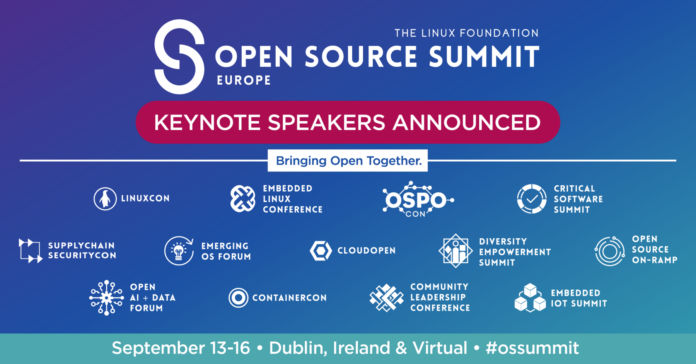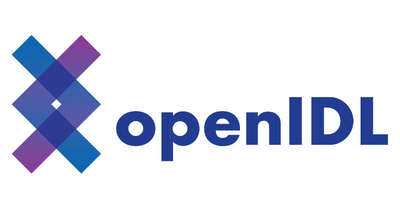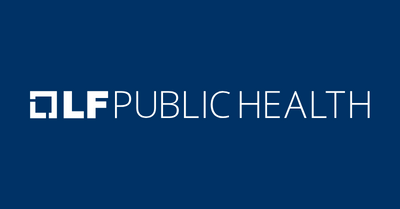Global visionaries headline the premier open source event in Europe to share on OSS adoption in Europe, driving the circular economy, finding inspiration through the pandemic, supply chain security and more.
SAN FRANCISCO, August 4, 2022 — The Linux Foundation, the nonprofit organization enabling mass innovation through open source, today announced the keynote speakers for Open Source Summit Europe, taking place September 13-16 in Dublin, Ireland. The event is being produced in a hybrid format, with both in-person and virtual participation available, and is co-located with the Hyperledger Global Forum, OpenSSF Day, Linux Kernel Maintainer Summit, KVM Forum, and Linux Security Summit, among others.
Open Source Summit Europe is the leading conference for developers, sys admins and community leaders – to gather to collaborate, share information, gain insights, solve technical problems and further innovation. It is a conference umbrella, composed of 13 events covering the most important technologies and issues in open source including LinuxCon, Embedded Linux Conference, OSPOCon, SupplyChainSecurityCon, CloudOpen, Open AI + Data Forum, and more. Over 2,000 are expected to attend.
2022 Keynote Speakers Include:
Hilary Carter, Vice President of Research, The Linux Foundation
Bryan Che, Chief Strategy Officer, Huawei; Cloud Native Computing Foundation Governing Board Member & Open 3D Foundation Governing Board Member
Demetris Cheatham, Senior Director, Diversity, Inclusion & Belonging Strategy, GitHub
Gabriele Columbro, Executive Director, Fintech Open Source Foundation (FINOS)
Dirk Hohndel, Chief Open Source Officer, Cardano Foundation
Ross Mauri, General Manager, IBM LinuxONE
Dušan Milovanović, Health Intelligence Architect, World Health Organization
Mark Pollock, Explorer, Founder & Collaborator
Christopher “CRob” Robinson, Director of Security Communications, Product Assurance and Security, Intel Corporation
Emilio Salvador, Head of Standards, Open Source Program Office, Google
Robin Teigland, Professor of Strategy, Management of Digitalization, in the Entrepreneurship and Strategy Division, Chalmers University of Technology; Director, Ocean Data Factory Sweden and Founder, Peniche Ocean Watch Initiative (POW)Linus Torvalds, Creator of Linux and Git
Jim Zemlin, Executive Director, The Linux Foundation
Additional keynote speakers will be announced soon.
Registration (in-person) is offered at the price of US$1,000 through August 23. Registration to attend virtually is $25. Members of The Linux Foundation receive a 20 percent discount off registration and can contact events@linuxfoundation.org to request a member discount code.
Health and Safety
In-person attendees will be required to show proof of COVID-19 vaccination or provide a negative COVID-19 test to attend, and will need to comply with all on-site health measures, in accordance with The Linux Foundation Code of Conduct. To learn more, visit the Health & Safety webpage.
Event Sponsors
Open Source Summit Europe 2022 is made possible thanks to our sponsors, including Diamond Sponsors: AWS, Google and IBM, Platinum Sponsors: Huawei, Intel and OpenEuler, and Gold Sponsors: Cloud Native Computing Foundation, Codethink, Docker, Mend, NGINX, Red Hat, and Styra. For information on becoming an event sponsor, click here or email us.
Press
Members of the press who would like to request a press pass to attend should contact Kristin O’Connell.
ABOUT THE LINUX FOUNDATION
Founded in 2000, the Linux Foundation and its projects are supported by more than 2,950 members. The Linux Foundation is the world’s leading home for collaboration on open source software, hardware, standards, and data. Linux Foundation projects are critical to the world’s infrastructure including Linux, Kubernetes, Node.js, ONAP, Hyperledger, RISC-V, and more. The Linux Foundation’s methodology focuses on leveraging best practices and addressing the needs of contributors, users, and solution providers to create sustainable models for open collaboration. For more information, please visit us at https://linuxfoundation.org/.
The Linux Foundation Events are where the world’s leading technologists meet, collaborate, learn and network in order to advance innovations that support the world’s largest shared technologies.
Visit our website and follow us on Twitter, LinkedIn, and Facebook for all the latest event updates and announcements.
The Linux Foundation has registered trademarks and uses trademarks. For a list of trademarks of The Linux Foundation, please see its trademark usage page: www.linuxfoundation.org/trademark-usage. Linux is a registered trademark of Linus Torvalds.
###
Media Contact
Kristin O’Connell
The Linux Foundation
koconnell@linuxfoundation.org
The post The Linux Foundation Announces Keynote Speakers for Open Source Summit Europe 2022 appeared first on Linux Foundation.




